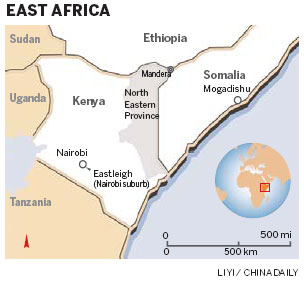Global General
Stark reality in a Somali community
By Hu Yinan (China Daily)
Updated: 2010-12-06 07:26
 |
Large Medium Small |
Fishing for answers
Specialists estimate Somalia's unemployment rate is 66 percent in urban areas and 41 percent in rural and nomadic regions, according to John C. K. Daly, a Washington DC-based scholar writing for the International Relations and Security Network's Security Watch, a leading open access information service. No relevant estimates are available for the tens of thousands of Somalis in Kenya's North Eastern province.
"Depredations will continue unless maritime nations add to their arsenal political efforts to resolve the country's immense political and economic problems and engage in a task most distasteful to Western countries, nation building," wrote Daly, who stressed that without such efforts, Somali pirates "fuelled by poverty and resentment" will never be gone in the face of ongoing illegal, unreported and unregulated fishing by foreign fleets.
Mwangura agreed and added that any genuine nation-building efforts must start at the community level and mobilize local resources, as well as involve, inevitably but indirectly, pirates.
"Within the Somali community, and all over the world, there are good and bad people. To stop bad people from doing bad, you have to do something for them and make them do something for themselves," said Mwangura.
For that to happen, one has to treat pirates like the organic members of those communities they are, he said. "We don't see them carrying their guns; (when) we look at them, they're carrying toys, not guns. We see them like human beings."
Mwangura continued: "You have to ... let people revitalize the fishing industry, camel breeding or agriculture in the region. Once people have got work to do, something to keep them busy, they'll stop (being pirates). It will take time - but along the way, they'll stop.
"When you talk to them as friends, they'll change," he added. "It may take 10 years but they'll change."
For Mwangura, efforts to help build roads, improve water facilities and upgrade infrastructure are vital in the process of nation building. China is doing exactly that. A group of Chinese construction companies are engaged in road-paving activities near Kenya's northern borders with Ethiopia and Somalia, where instability is rife.
China-Africa trade rose from $10.6 billion in 2000 to $106.8 billion in 2008.
Last year, China's direct investment in the continent stood at $1.44 billion, an almost sixfold increase on 2000, and by the start of 2010, China had canceled more than 300 zero-interest loans owed by 35 heavily-indebted and underdeveloped African nations.
The country has emerged as Africa's top trading partner on a continent that is already China's fourth biggest overseas investment destination.
At a seminar in South Africa marking the 10th anniversary of the establishment of the Forum on China-Africa Cooperation in November, Vice-President Xi Jinping vowed to further enlarge China's trade and boost assistance to Africa.
"Every percentage growth in Africa gives us a big chunk of the market (but) our investment now is still not enough," said Jiang Wei, China's Economic and Commercial Counselor in Kenya.
"Chinese enterprises still prefer to do trade (in Africa), but in fact there are many potential investment opportunities here," he said. "To the world, (investment and assistance projects in Africa) are significant to China's image as an important, responsible stakeholder. Domestically, they can help curb unemployment and address (China's) export of production equipment."
Han Jun, chairman of the Kenya Overseas Chinese Association, added that Chinese investment is welcomed in Africa "because we come with no strings attached".
"We have always firmly supported the independent and indigenous development of countries," he said.
This story was made possible by the China-Africa Journalists' Study Tour Program arranged by the University of Witwatersrand's school of journalism in Johannesburg, South Africa.
